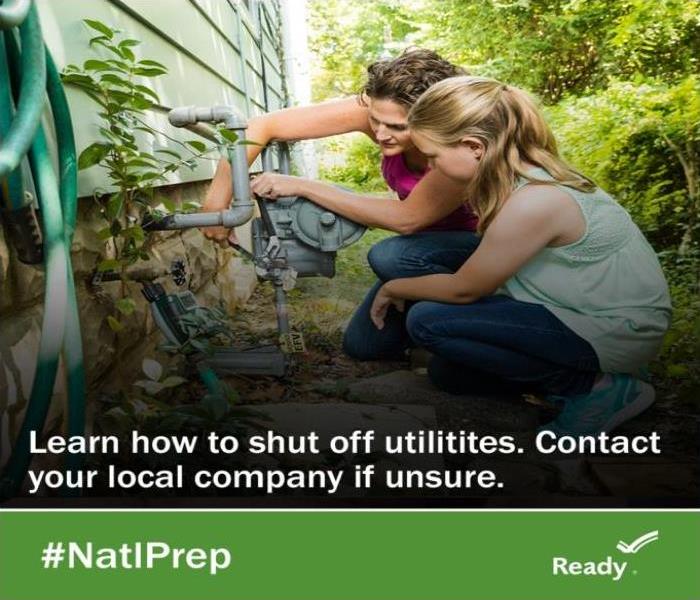National Preparedness Month- Week 4: Teach Youth About Preparedness- Wildfires
9/23/2020 (Permalink)
Each year Riverside county is faced with wildfires.
How can you ensure your kids are informed on what to do if a wildfire hits your Riverside area. What if your kids are not with you when this happens? Ready.gov can help you and your family plan for such disasters. Here are some tips.
A wildfire is a fire that burns out of control in a natural area, like a forest, grassland, or prairie. Wildfires can start from natural causes, such as lightening, but they are usually caused by humans, such as campers or hikers who did not put out their campfire properly. Wildfires spread quickly, burning brush, trees, and homes in its path. They can also affect natural resources (such as soil, animals, forests), destroy homes, and put people’s lives in danger.
Words to know!
Evacuation
Leaving an area that has been declared unsafe.
Evacuation Notice
An evacuation notice tells you that a fire is nearby, and it is important—or mandatory—to leave the area.
Fire Extinguisher
A fire protection device that sprays foam and is used to help put out small fires.
Fire Weather Watch
A notice that dangerous fire weather conditions are possible over the next 12 to 72 hours.
Red Flag Warning
Also called a Fire Weather Warning, it is a warning for when fire danger exists because of weather patterns.
Smoke Alarms
Sensors attached to the ceiling that sound an alarm when they sense smoke.
Am I at Risk?
Wildfires can happen anywhere, anytime. The chance of wildfires happening is higher when there is little or no rainfall. This makes bushes, grass and trees dry and easier to burn. High winds can spread wildfires. Your community may have a designated wildfire season when the risk is particularly high.
What Can I do?
Before
- Build an emergency kit.
- Make a family communications plan.
- Know your evacuation route.
- Make sure your family has smoke alarms on every level of your home, especially in bedrooms. Ask your parents to check them every month and to change the batteries every year.
- If you don’t have a smoke alarm, check with your local fire department about getting a free one.
- Help your parents to rake the lawn and get rid of leaves and twigs. These can catch fire if a wildfire is near your home. Never play with matches. You could accidentally start a fire.
During
- Listen to emergency officials
- Follow local emergency officials’ orders. If they say to evacuate, do so immediately.
- If you see a wildfire, call 911. You may be the first person to have spotted it!
- If trapped, call 9-1-1.
- An adult might ask you to wear a mask. Keep this on- it will help keep dangerous particles from smoke and ash out of the air you breathe.
After
- Call 9-1-1 and seek help immediately if you or someone you are with has been burned. Cool and cover burns to reduce the chance of further injury or infection.
- If you are at home, keep a “fire watch.” That means, look for smoke or sparks throughout the house. If you see anything, tell a grown-up immediately!
- If you have evacuated, do not go home until safety officials say it’s okay. Stay away from downed or dangling power lines. They could electrocute you.
- Avoid walking on hot/burning surfaces. After a fire, the ground may contain heat pockets or hidden embers. Stay away. They could burn you or spark another fire.
- If you have animals, watch them closely and keep them under your control. Note that hidden embers and hot spots could burn their paws or hooves.
- Do not use water from the faucet unless emergency officials say it’s okay.
- Burned areas should be monitored for at least 12 hours to make sure the fire is out and danger has past.
- Do not attempt to remove heavy debris by yourself. Wear protective clothing, including a long-sleeved shirt, long pants, work gloves and sturdy, thick-soled shoes during clean up. These will protect you from further injury from broken glass, exposed nails or other objects.
- Throw away food exposed to heat, smoke, or soot. When in doubt throw it out.
- Use text or social media to communicate with your family and friends.
Watch a Video
Did you know?
The three elements needed to create and keep a fire burning are heat, fuel, and oxygen, also known as the fire triangle.
Incident Meteorologists (IMETs) are a group of around 70 specially-trained weather experts with the National Weather Service. They work closely with wildfire responders at wildfire sites to monitor, analyze, and report fire and weather conditions. Their forecasts help firefighters plan operations when dealing with the unpredictable nature of fire. This helps keep emergency responders safe.
Please use the link to watch a couple of videos with your kids to help them understand further the threat of a wildfire and what they can do.
Wildfires can cause a lot of damage to your home. Let SERVPRO help you, keep our information handy. We are an emergency service company. We know how to address damage due to fire, smoke, soot or water.
SERVPRO of West Riverside City
951-351-8033
We are available 24/7, we are always here to help!






 24/7 Emergency Service
24/7 Emergency Service
